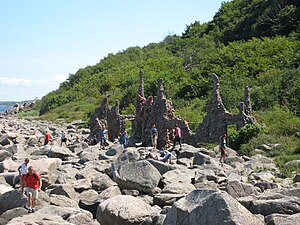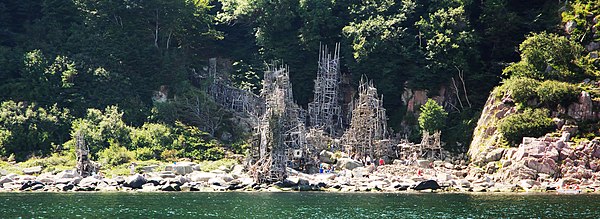Ladonia (micronation)
Royal Republic of Ladonia | |
|---|---|
| Motto: Suum Cuique To Each His Own | |
| Anthem: Two unnamed anthems[1] | |
 | |
| Status | Current |
| Capital | Wotan City[2] |
| Official languages | [3] |
| Government | Constitutional monarchy |
• Monarch | Queen Carolyn I |
| Christopher Matheoss | |
| Lt. Col. Osborne Wrigley-Pimley-McKerr III | |
| Lars Vilks | |
| Establishment | |
• Declared | June 2, 1996 |
| Area | |
• Total | 1 km2 (0.39 sq mi) |
| Membership | 14299[4] (2008-01-01) |
| Currency | Örtug[5] |
Ladonia (Template:Lang-sv) is a micronation, proclaimed in 1996 as the result of a years-long court battle between artist Lars Vilks and local authorities over two sculptures. The claimed territory is part of the natural reserve of Kullaberg in southern Sweden.
History
In 1980, artist Lars Vilks began construction of two sculptures, Nimis (Latin for "too much", a structure made of 75 tonnes of driftwood) and Arx (Latin for "fortress", a structure made of stone), in the Kullaberg nature reserve in north-west Skåne, Sweden. The location of the sculptures is difficult to reach, and as a consequence they were not discovered for two years, at which point the local council declared the sculptures to be buildings, the construction of which was forbidden on the nature reserve, and demanded that they should be dismantled and removed.


Vilks appealed the decision of the council, but lost. He appealed repeatedly, and finally the case was settled, in the council's favour, by the Swedish government. However, in the meantime Nimis had been bought from Vilks by the artists Christo and Jeanne-Claude after the death of Joseph Beuys, who bought it in 1984. On June 2, 1996 Vilks declared the microstate of Ladonia in protest of the local council.[6]
In 1999, another sculpture, Omphalos (named after Omphalos, a small sculpture in the temple at Delphi, "marking the centre of the world"), was created. It was made of stone and concrete, 1.61 metres high and weighing a tonne. The Gyllenstiernska Krapperup Foundation, formed to promote art and culture, accused Vilks of building this sculpture and complained to the police, and in August 1999 the district court ordered its removal. The Foundation had also demanded the removal of Nimis and Arx, but the court ruled against it. The Foundation appealed this decision to the Supreme Court, who eventually ruled against it. The police were unable to positively identify Vilks as the sculptor, but the district court held that he was.
The removal of Omphalos was itself controversial. Vilks was ordered to find an acceptable way to remove the sculpture. He proposed blowing it up on 10 December 2001, Nobel Day and the 100th anniversary of the Nobel Prize, and applied to the county council for permission to do so. The county council made a decision on 7 December, but kept it secret until 10 December. By that time, another artist, Ernst Billgren, had bought Omphalos from Vilks, and had requested that it not be damaged. In the early hours of 9 December, a crane boat was sent (by DYKMA, under contract from the Enforcement Administration) to the site and removed the sculpture (at a cost of SEK 92,500, billed to Vilks). Despite the new owner's request, the sculpture was damaged by handling. In response to this, the Enforcement Administration was satirically declared to be "Performance Artist of the Year" in 2002.
Afterwards, Vilks applied to the county council again, this time for permission to erect a memorial in the place that Omphalos had stood. Permission was granted by the council to erect a monument no greater than 8 centimetres high. This was duly done, and the monument was inaugurated on 27 February 2002.
Government

The government of Ladonia is jointly led by a Queen and a President. The President and Vice-President are elected tri-annually, while the Queen, once crowned, reigns for life. The current President is Christopher Matheoss of the Party Monarchical Republic and the current Vice-President is Lieutenant Colonel His Illustrious Highness Osborne Wrigley-Pimley-McKerr III, Count Wrigley of Håle.[7] Vilks, the State Secretary, performs or oversees many of the day-to-day operations of the microstate, including processing new citizenship applications and posting photos and news items to the Ladonian online "newspaper". The Cabinet Ministers are the legislative body in Ladonia, and they participate in debates and vote on proposals via the Internet. Many Ladonian ministries have artistic connotations and whimsical names.[8]
Demographics
When it was created, Ladonia had no population. As of 2016, there are 17,752 Ladonian citizens from more than 50 countries. None of the citizens resides within Ladonia's borders,[9] although there has been at least one resident citizen in the past.[10]
Nimis
Nimis is a series of wooden sculptures situated along the coast in the Kullaberg Nature Reserve, Höganäs Municipality, in the northern part of Skåne County, Sweden. They are a massive, wooden labyrinthine structure connected by several wooden towers, and are said to be mostly constructed from driftwood.
They were begun by the artist Lars Vilks in 1980 and have been the subject of a long-running legal dispute between the Swedish authorities and the artist. As no permission was given to build on the site within the nature reserve, the County Administrative Board in Skåne has sought to have Nimis demolished, despite the fact that it has become a popular tourist attraction.
As Nimis's existence is not sanctioned by Sweden, it is difficult to find - there are no official sign posts in Sweden, nor is it marked on maps. It lies a few kilometres northwest of the town of Arild and somewhat farther from the town of Mölle, and can only be reached on foot following a well-worn path with yellow Ns painted on trees and fences. The path begins as an easy stroll past Himmelstorp, a well-preserved eighteenth-century farmstead, but quickly becomes a steep and rocky climb down to the coast.

Notes
- ^ There are two national anthems. One is composed by Greve Jan Lothe von Eriksen and is executed when a stone is thrown into the water. The other is composed by the Minister of Health Toomas Mathiesen and can be described as a tone poem on the development of Ladonian freedom.
- ^ "The Constitution of Ladonia". Ladonia.org.
- ^ "Micronations".
- ^ "14 000 Ladonia citizens". Ladonia New Herald.
- ^ 1 Örtug is about 10 SEK.
- ^ "History of Ladonia - Ladonia". Ladonia.
- ^ "The result of the election - Election 2013". Ladonia New Herald. 3 June 2013.
- ^ "The constitution of Ladonia - Ladonia State Affairs". Ladonia New Herald. 9 July 2009.
- ^ Ladonia's population chart on www.ladonia.org
- ^ Lars Vilks (2009-11-29). "President Election: Candidates - Election 2010 - Ladonia New Herald". Ladonia New Herald. Retrieved 2015-04-14.
References
- "Omphalos". Moderna Museet. Retrieved July 14, 2005.
- "Filippa Kihlborg in Ladonia". Retrieved July 14, 2005.
- "Visa for Ladonia". The Power of Culture. 2002-04-03.
- "Pakistanis' 'new life' in imaginary country". BBC News. 2002-03-11.
- TT Spektra (2006-07-03). "Påhittat land fyller tio år" (in Swedish). Svenska Dagbladet.
- Truc Olivier (2002-03-14). "Le pays virtuel qui attire 3000 réfugiés". Libération (in French).
External links
- The official Ladonia website
- The Ladonia New Herald
- The Office of Nothingness, which also manages the 1st chamber of the Ladonian Parliament
- The Ministry of Hunting and Game preservation
- The Ministry of Art and Jump
- The Ministry of Undisclosable Purpose
- The passports of the Minister of Duct Tape and High Voltage, the Minister of the Dark Side, the Minister of Holidays, and the Minister of Unnumbered Things.


